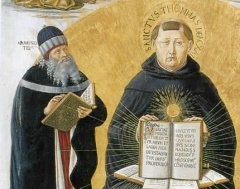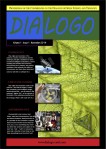 It is hard to find a balance when it comes to our attitude towards the science and academia in the Middle Ages. Opinions vary. We find those who simply regard this period in history as the dark age which only obscured and prevented the development of real science. Others acknowledge the importance of the origin of universities in France, Germany, Italy, and other European countries at that time. And yet, they remain skeptical about the methodology of Aristotelian scholasticism developed in Paris, and Platonic overtones predominant in the medieval science at Oxford. Still others emphasize the importance of the mathematical reasoning of Roger Backon and the origins of new empiricism developed at Paris (Albert the Great, O.P., Peter of Maricourt, and Theodoric of Freiburg, O.P.). They may had been far away from our modern understanding of mathematics and empirical method in science, but we would not be where we are with our scientific development if not their contribution.
It is hard to find a balance when it comes to our attitude towards the science and academia in the Middle Ages. Opinions vary. We find those who simply regard this period in history as the dark age which only obscured and prevented the development of real science. Others acknowledge the importance of the origin of universities in France, Germany, Italy, and other European countries at that time. And yet, they remain skeptical about the methodology of Aristotelian scholasticism developed in Paris, and Platonic overtones predominant in the medieval science at Oxford. Still others emphasize the importance of the mathematical reasoning of Roger Backon and the origins of new empiricism developed at Paris (Albert the Great, O.P., Peter of Maricourt, and Theodoric of Freiburg, O.P.). They may had been far away from our modern understanding of mathematics and empirical method in science, but we would not be where we are with our scientific development if not their contribution.
 While pursuing my research on Aquinas’ understanding of causality I came across a passage in his Commentary on Aristotle’s Physics that blew my mind. Speaking of those who reject teleology (the claim that nature acts for an end) Aristotle refers to some thinkers who suggest that everything in nature happens out of necessity. It may look to us – they say – that things come to be for and end, while they are actually organized “spontaneously in a fitting way,” which helps them to survive, unlike those things or organisms that grew otherwise, which “perished and continue to perish.” (Physics II, 8 [198b 29-32])
While pursuing my research on Aquinas’ understanding of causality I came across a passage in his Commentary on Aristotle’s Physics that blew my mind. Speaking of those who reject teleology (the claim that nature acts for an end) Aristotle refers to some thinkers who suggest that everything in nature happens out of necessity. It may look to us – they say – that things come to be for and end, while they are actually organized “spontaneously in a fitting way,” which helps them to survive, unlike those things or organisms that grew otherwise, which “perished and continue to perish.” (Physics II, 8 [198b 29-32])
This passage from Aristotle, which already looks like the first description of natural selection, was commented by Aquinas, whose definition is even closer to the one formulated by Darwin and modern evolutionary theory. Referring to the same group of thinkers who rejected teleology and argued for necessity of natural events Aquinas says that “they say that from the beginning of the formation of the world the four elements [earth, water, air, fire] were joined in the constitution of natural things, and thus the many and varied dispositions of natural things were produced. And in all these things only that which happened to be suitable for some utility, as if it were made for that utility, was preserved. For such things had a disposition which made them suitable for being preserved, not because of some agent intending an end, but because of that which is per se vain, i.e., by chance. On the other hand, whatever did not have such a disposition was destroyed, and is destroyed daily. Thus Empedocles said that in the beginning things which were part ox and part man were generated.” (In phisica II, lect. 8, no. 253)
 This quotation is striking. Naturally, it would be an unjustified simplification to infer from this passage that Aristotle and Aquinas either developed or accepted the theory of evolution. The empirical scientific data both in antiquity and in the Middle Ages would not support such a claim. On the other hand, however, they were both careful observers of changes and processes of nature, and developed metaphysics and theology (in the case of Aquinas) which can be supportive and serve as a background of evolutionism. This topic is the subject of my paper which is at present in the review of Theology and Science. I hope it will be accepted and published later this year.
This quotation is striking. Naturally, it would be an unjustified simplification to infer from this passage that Aristotle and Aquinas either developed or accepted the theory of evolution. The empirical scientific data both in antiquity and in the Middle Ages would not support such a claim. On the other hand, however, they were both careful observers of changes and processes of nature, and developed metaphysics and theology (in the case of Aquinas) which can be supportive and serve as a background of evolutionism. This topic is the subject of my paper which is at present in the review of Theology and Science. I hope it will be accepted and published later this year.
Coming back to Aristotle’s and Aquinas’ descriptions of natural selection, we should notice that neither one of them says openly whether he finds the very core of the idea plausible. What seems to be clear, however, is the fact that that they both reject it as interpreted in terms of the necessity of chance (this term is defined nowadays as the “blind” or the “absolute” chance). They would rather argue that nature always acts for an end, which is natural and intrinsic to things and organisms. Those who support Aristotle’s philosophy of nature nowadays, emphasize that chance events at the bottom line of evolutionary processes happen in organisms which by definition strive to survive and produce offspring. Therefore, chance events have to be related to regularity and teleology present in nature.
Moreover, some of the leading evolutionary biologists in the 20th century (Dobzhansky and Ayala) say that mutations alone, if uncontrolled, would lead to the breakdown and extinction of life, rather than to adaptive evolution. They have to be “controlled” by natural selection, which, according to Ayala, is not only a purely negative mechanistic end-directed process that promotes the useful and gets rid of harmful mutants, increasing thus reproductive efficiency. It implies creativity and teleology, that is a production and maintenance of end-directed organs and processes. (See Dobzhansky, Genetics of the Evolutionary Process, 65; Ayala, “Teleological Explanations in Evolutionary Biology,” in Nature’s Purposes. Analyses of Function and Design in Biology, 35, 41.)
 Now, it becomes obvious that this assertion brought by Ayala is a modern expression of the same idea, formulated in ancient philosophy by Aristotle and developed later on by Aquinas. It would be too much to say that the theory of natural selection goes back to Aristotle and Aquinas. But on the other hand, Darwin himself, a few months before his death in 1882, received from William Ogle a copy of his new translation of Aristotle’s Parts of Animals. In his response to Ogle, Darwin says: “You must let me thank you for the pleasure which the Introduction to the Aristotle book has given me. I have rarely read anything which has interested me more; though I have not read as yet more than a quarter of the book proper. From quotations which I had seen I had a high notion of Aristotle’s merits, but I had not the most remote notion what a wonderful man he was. Linnaeus and Cuvier have been my two gods, though in very different ways, but they were mere school-boys to old Aristotle.”
Now, it becomes obvious that this assertion brought by Ayala is a modern expression of the same idea, formulated in ancient philosophy by Aristotle and developed later on by Aquinas. It would be too much to say that the theory of natural selection goes back to Aristotle and Aquinas. But on the other hand, Darwin himself, a few months before his death in 1882, received from William Ogle a copy of his new translation of Aristotle’s Parts of Animals. In his response to Ogle, Darwin says: “You must let me thank you for the pleasure which the Introduction to the Aristotle book has given me. I have rarely read anything which has interested me more; though I have not read as yet more than a quarter of the book proper. From quotations which I had seen I had a high notion of Aristotle’s merits, but I had not the most remote notion what a wonderful man he was. Linnaeus and Cuvier have been my two gods, though in very different ways, but they were mere school-boys to old Aristotle.”
Darwin died soon after sending his letter to Ogle, and we don’t know if he read more of Aristotle. I’m pretty sure that if he had continued his research, he might have been surprised finding Aristotle’s reflection on natural selection. I think that it proves again that the old folks like Aristotle and Aquinas are not outdated and should not be ignored. My friend from Poland who is a biochemist sent me an information found on Wikipedia which says that: “In recent years, the cognitive neuroscientist Walter Freeman proposes that Thomism is the philosophical system explaining cognition that is most compatible with neurodynamics, [which he explains] in a 2008 article in the journal Mind and Matter entitled “Nonlinear Brain Dynamics and Intention According to Aquinas.””
Therefore, it is not an anachronism to claim that Aristotle’s philosophy and Thomism are relevant in the context of contemporary scientific, philosophical, and theological debates. Viva Aristotle! Viva Aquinas! 🙂





